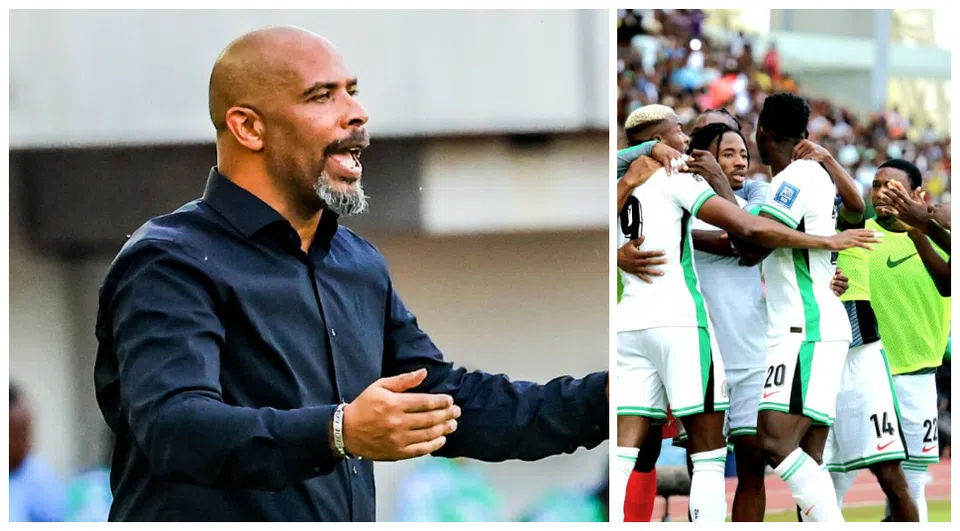In a week when football and politics collided, the story of Super Eagles team dynamics and external criticism became impossible to ignore, from the dressing room debates about who starts in goal to a public broadside from South Africa’s sports minister. Nigeria’s response on and off the pitch will shape how the playoff journey unfolds in Morocco in mid November.
The result that changed the conversation
Nigeria’s 4-0 win over Benin Republic in Uyo was more than a statement of intent, it unlocked two different destinies. The Super Eagles secured a 2026 FIFA World Cup playoff ticket, and South Africa, as a result, sealed automatic qualification from Group C. That single afternoon reframed narratives across the continent.
It is why the backlash from South Africa resonated so loudly. For former NFF president Amaju Pinnick, the performance in Uyo demanded recognition, not resentment. He argued that South Africa directly benefited from Nigeria’s victory and that perspective mattered.
McKenzie’s outburst and Pinnick’s reply
South Africa’s Minister of Sport, Gayton McKenzie, went public with a stark wish that Nigeria should fail in the playoffs. The words were clear and confrontational, and they immediately drew Nigeria’s attention. The minister’s message stirred emotion across Nigeria’s football community.
I want to make it very clear, I wish for them not to qualify. I knew what they did behind the scenes. I want them to lose. Nigeria must not go to the World Cup. Another African country must go.
Pinnick’s answer arrived with both conviction and restraint. He called the stance unbecoming of a public official and appealed to a higher ideal for sport and leadership. He also insisted that no careless statement could derail Nigeria if qualification is meant to be.
If it is the wish of God that Nigeria should qualify for the World Cup, the South African sports minister’s careless statement cannot stop it from happening.
The gratitude argument and a reminder from 2018
Pinnick also framed the moment as a question of gratitude. He said Nigeria’s win over Benin ensured South Africa’s automatic ticket, which should have prompted appreciation rather than hostility. The former NFF boss drew a line to history as well, recalling that Nigeria accepted a punishment in 2018 for fielding an ineligible player without blaming anyone else.
We did not point fingers then and that, in his view, is how accountability in sport should look. That contrast, he suggested, is instructive as the continent prepares for another intense qualification finish.
What lies ahead for Nigeria in Morocco
Nigeria advanced as one of the best group runners up, setting up a high pressure playoff route. The Super Eagles face Gabon in a single leg semi final in Morocco on November 13, a match with no margin for error. The winner moves to a final on November 16, also in Morocco, for a place in the intercontinental playoffs in Mexico.
Every decision now carries weight, from who marshals the back line to who wears the gloves. Eric Chelle’s clarity will be tested in the most unforgiving of formats.
Inside the goalkeeping debate
The most sensitive conversation in the camp revolves around the No. 1 shirt. Former Super Eagles defender Sam Sodje has urged Chelle to take a hard look at Stanley Nwabali’s current form and demeanor. Sodje worries that confidence has tipped into something counterproductive.
Speaking on Brila FM, he cited recent errors, including a crucial fumble that led to a goal in the nervy 2-1 win over Lesotho earlier this month. He warned that warning signs are blinking and that proactive management is essential, potentially with the help of a psychologist before the playoff begins.
When you have players like Stanley, the way he plays, talks and carries himself, there is a difference between being confident and having a bad attitude. If the coach feels like Stanley will cost us the game, you better make the change now before it is too late.
Competition has intensified with Maduka Okoye’s resurgence in Italy. That reality, as much as any tactical tweak, could define Chelle’s choices in Morocco.
Okoye’s return that changes the picture
At Udinese, technical director Gianluca Nani has praised Okoye’s standard in training since returning from a suspension that kept him out of the opening eight matches. Nani said it was almost impossible to score against the goalkeeper in training, and the club moved swiftly to restore him to the starting lineup.
Okoye’s comeback match, a 1-1 draw against US Cremonese, offered a sharp snapshot of his readiness. He produced commanding saves, including a crucial stop to deny Jamie Vardy from point blank range, a moment that suggests sharp reflexes and renewed confidence.
Okoye has trained really well in recent weeks, it was almost impossible to score against him in training. We are really happy he is back because he is our starting goalkeeper and there were never any doubts.
For Nigeria, that form fuels a healthy competition. The former Watford goalkeeper last featured for the Super Eagles in a friendly against Russia in June 2025, and he remains in a race with Adebayo Adeleye and Francis Uzoho for selection. It is a contest that will push standards high in the final days before the list is announced.
Why leadership and tone matter now
The flashpoint with McKenzie is not just about rivalry, it is about tone and responsibility in a sport that millions follow. Pinnick’s call for a more statesmanlike approach speaks to the example leaders set when tensions rise. Nigeria’s camp appears intent on letting performances, not proclamations, do the loudest talking.
Moments like these harden a squad’s resolve. The Super Eagles know that pressure from outside can either fracture belief or forge a stronger core. Their task is to convert noise into fuel.
Three decisions Chelle must nail
- Who starts in goal, Nwabali’s experience or Okoye’s momentum,
- How to balance assertiveness with calm in a single leg tie,
- Which leaders carry the huddle when anxiety spikes in the first 15 minutes.
How Nigeria can keep control of the narrative
External criticism is part of elite sport, but the best teams turn it into clarity. That begins with training sessions where roles are defined and communication is crisp. It continues with a match plan that anticipates early Gabon pressure and identifies where Nigeria can tilt the rhythm in midfield.
On the touchline, Chelle’s staff can align messages for both scenarios, early lead protection or a chase. Preparation for set pieces, both ways, could be the difference in a knockout tie decided by thin margins.
The emotional undercurrent in the goalkeeping battle
Every goalkeeper carries a storyline that the cameras never fully capture. For Nwabali, it is about filtering scrutiny while sharpening decision making, and for Okoye, it is about turning a club resurgence into national trust. Each training repetition becomes a referendum on readiness.
Sodje’s suggestion to involve a psychologist hints at a broader truth, confidence is a resource that can be coached, measured, and restored. The Super Eagles have time for targeted work, the key is choosing early and backing the decision with conviction.
Gabon on the horizon and the stakes in Morocco
Gabon will see a team in transition and try to unsettle it. Nigeria’s responsibility is to show early authority, control the tempo, and make the first big chance count. The single leg format rewards clarity and punishes drift.
Win on November 13, and Nigeria’s path extends to a final three days later for a place in the intercontinental playoffs in Mexico. Lose, and a cycle of rebuilding would begin sooner than anyone wants.
What to watch in Morocco
- Noise versus focus, whether the squad treats McKenzie’s remarks as motivation or distraction,
- The No. 1 call, if Chelle rides with Nwabali or hands the gloves to Okoye,
- First contact moments, duels, second balls, and set pieces in the opening quarter hour.
The final word
Nigeria’s journey to the 2026 World Cup playoffs has already been shaped by a big win in Uyo and a loud debate beyond its borders. The next chapter will be written in Morocco, where selection courage and competitive edge will matter more than any microphone moment. Victory would answer the only question that counts.
In the end, the Super Eagles will be judged by their resolve, their choices, and the way they turn pressure into performance. That is the essence of team dynamics, and it is the best response to criticism from the outside.






